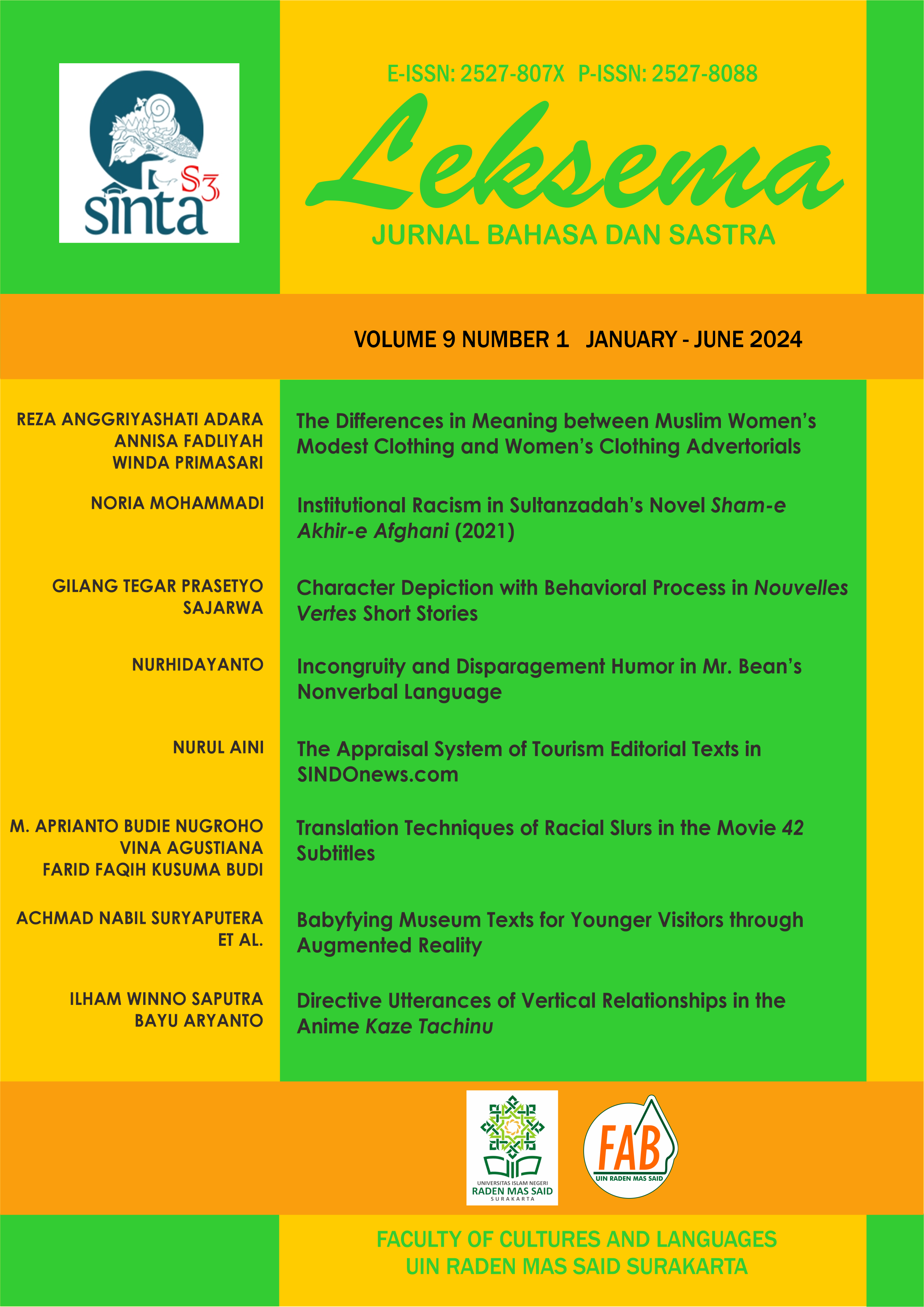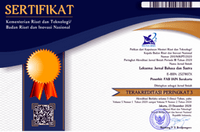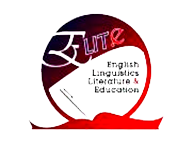CHARACTER DEPICTION WITH BEHAVIORAL PROCESS IN 'NOUVELLES VERTES' SHORT STORIES
DOI:
https://doi.org/10.22515/ljbs.v9i1.8903Keywords:
behavioral process, characterization, short story, systemic functional linguisticAbstract
This study aims to describe the forms of clauses with behavioral processes that explain characterizations in the short story anthology Nouvelles Vertes, and the characterization techniques realized by the behavioral processes. This research uses a descriptive approach with qualitative method. The data of this research are clauses that explain characterization with behavioral process in the short stories of Nouvelles Vertes anthology. This research uses the theory of Systemic Functional Linguistics by Halliday and Matthiesen (2014) and characterization technique by Nurgiyantoro (2018). The results show that there are three types of behavioral processes used to explain characterization, i.e. verbal, mental, and physical. The characterization techniques realized with behavioral processes are in the form of character reaction techniques and thoughts and feelings techniques. The tendency to use behavioral processes with character reaction techniques shows that each event in the short story directly affects the character's behavior in terms of speech, actions, and feelings.
Downloads
References
Afrianto, Eva Tuckyta Sari Sujatna, Nani Darmayanti, and Farida Ariyani. 2021. “Configuration of Lampung Mental Clause: A Functional Grammar Investigation”. Proceedings of the Ninth International Conference on Language and Arts (ICLA 2020) 539 (Icla 2020): 222–26. doi:10.2991/assehr.k.210325.039.
Akinmusuyi, Samuel Akindeji. 2023. “Transitivity System and Ideological Framing in News Headlines Reporting Gender-Based Violence in Nigeria”. Traduction et Langues 22 (2): 232–55. doi:10.52919/translang.v22i2.959.
Alhumsi, Mohammad Husam and Najah Saad Alsaedi. 2023. “A Transitivity Analysis of Two Political Articles: An Investigation of Gender Variations in Political Media Discourse”. World Journal of English Language 13 (6): 107–18. doi:10.5430/wjel.v13n6p107.
Andini, Novita Pri. 2010. Perwatakan Tokoh-Tokoh Dalam Novel The Red Badge of Courage Karya Stephen Crane: Sebuah Kajian Psikologi Sastra. Jakarta: Universitas Negeri Jakarta.
Arigusman, Anggi. 2018. “An Analysis of Student’s Narrative Text Writing: An SFL Approach”. International Journal of Languages, Literature and Linguistics 4 (2): 93–100. doi:10.18178/ijlll.2018.4.2.156.
Armini, Alice. 2016. “Cerpen-cerpen Hijau Dalam Antologi Nouvelle Verte Sebagai Penyelamat Lingkungan Hidup”. In Proceeding International Conference on Literature XXV.
Banks, David. 2002. “Systemic Functional Linguistics as a Model for Text Analysis”. ASp 36 (35–36): 23–34. doi:10.4000/asp.1584.
Dewi, Novita. 2016. “Ekokritik Dalam Sastra Indonesia: Kajian Sastra Yang Memihak”. Adabiyyāt: Jurnal Bahasa Dan Sastra 15 (1).
Eriyanto. 2015. Analisis Wacana : Pengantar Analisi Teks Media. Yogyakarta: LKiS.
Grezka, Aude. 2016. “Classes et Relations Sémantiques : L’exemple Du Verbe Regarder”. Neophilologica 20. https://hal.science/hal-03656555.
Halliday, MAK and Christian MIM. Matthiessen. 2014. Halliday’s Introduction to Functional Grammar. Halliday’s Introduction to Functional Grammar: Fourth Edition. 4th ed. New York: Routledge. doi:10.4324/9780203431269.
Hamdache, Abdulmenem. 2016. “The Use of Hallidayan Transitivity to Analyze The Discourse of The U.S. State Department and Commitment to Destroy ISIS: A Corpus Linguistics Study”. Theoretical and Applied Linguistics 2: 52–109. doi:10.22250/2410-7190.
Lafamane, Felta. 2020. Karya Sastra (Puisi, Prosa, Drama). https://doi.org/10.31219/osf.io/ bp6eh.
Martin, Fabienne and Christopher Pinon. 2020. “Verbalizing Nouns and Adjectives: The Case of Behavior-Related Verbs”. Glossa 5 (1): 1–34. doi:10.5334/GJGL.833.
Maulina, Yeni, and Khairul Azmi. 2019. “Gaya Bahasa Dalam Pepatah Adat Masyarakat Petalangan Riau”. Madah: Jurnal Bahasa Dan Sastra 10 (2): 285–96.
Nurgiyantoro, Burhan. 2018. Teori Pengkajian Fiksi. Yogyakarta: Gadjah Mada University Press.
Nurrahmah, Wirduna, Yusri and Subhayni. 2020. “Transitivitas pada Teks Cerpen Harian Kompas (Kajian Linguistik Fungsional Sistemik)”. Jurnal Dedikasi Pendidikan 4 (1): 150–58. http://jurnal.abulyatama.ac.id/index.php/dedikasi.
Ollivier, Mikaël. 2005. Nouvelles Vertes. Paris: Thierry Magnier.
Pickering, James H. 1993. Fiction 50: An Introduction to The Short Story. New York: Macmillan Publishing Company.
Pradopo, Rahmat Djoko. 1995. Beberapa Teori Sastra, Metode, Kritik, Dan Penerapannya. Yogyakarta: Pustaka Pelajar.
Rafiqa, Syafira. 2021. Penokohan Dalam Cerita Rakyat (Perspektif Linguistik Sistemik Fungsional). Tarakan: Syiah Kuala University Press & Universitas Borneo Tarakan.
Semadi, Yoga Putra. 2021. “Behavioral Process in Text of I Durma Anak Lara: Systemic Functional Linguistics”. International Journal of Systemic Functional Linguistics 3 (2): 64–71. doi:10.55637/ijsfl.3.2.3723.64-71.
Sudaryanto. 2015. Metode Dan Aneka Teknik Analisis Bahasa (Pengantar Penelitian Wahana Kebudayaan Secara Linguistis). 1st ed. Yogyakarta: Sanata Dharma University Press.
Sugiyanti, Nunik Eka, and Miftahulkhairah Anwar. 2023. “Mengaitkan Pembelajaran Sastra dan Bahasa Melalui Pendekatan Linguistik Fungsional Sistemik”. Jurnal Ilmu Budaya 11 (1): 167–72.
Thompson, Geoff. 2014. Introducing Functional Grammar. New York: Routledge.
Waluyo, Herman J. 2009. Pengkajian dan Apresiasi Prosa Fiksi. Surakarta: Universitas Sebelas Maret.
Wardani, Vera, Rustono, and Hari Bakti Mardikantoro. 2023. “Analisis Wacana Kritis Model Roger Fowler Dalam Wacana Teks Berita Tentang Penyerangan Hamas Palestina Terhadap Israel Dalam Tiga Sumber Berita Online”. Journal Metrum 1 (1): 58–75.
Wicaksono, Andi. 2017. Pengkajian Prosa Fiksi. (Revised Edition). Yogyakarta: Garudhawaca.
Widayati, Sri. 2020. Buku Ajar Karya Prosa Fiksi. Baubau: LPPM Universitas Muhammadiyah Buton Press.
Wiratno, Tri. 2018. Pengantar Ringkas Linguistik Sistemik Fungsional. Yogyakarta: Pustaka Pelajar.
Zulprianto and Rebecca Fanany. 2023. “Exploring the Experiential Meanings of the COVID-19 Survivors’ Expressions.” Studies in English Language and Education 10 (3): 1485–1500. doi:10.24815/siele.v10i3.29502.
Downloads
Published
Issue
Section
License
Copyright (c) 2024 Leksema: Jurnal Bahasa dan Sastra

This work is licensed under a Creative Commons Attribution-NonCommercial-ShareAlike 4.0 International License.
The copyright of the received article shall be assigned to the publisher of the journal. The intended copyright includes the right to publish the article in various forms (including reprints). The journal maintains the publishing rights to published articles.
In line with the license, the authors and users (readers or other researchers) are allowed to share and adapt the material only for non-commercial purposes. In addition, the material must be given appropriate credit, provided with a link to the license, and indicated if changes were made. If authors remix, transform or build upon the material, authors must distribute their contributions under the same license as the original.








